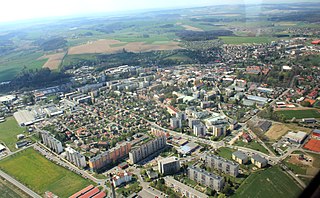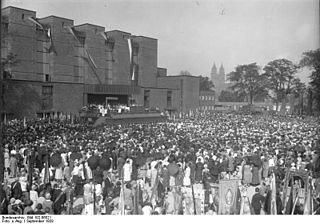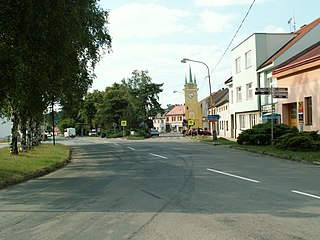
The Evangelical Church in Germany is a federation of twenty one Lutheran, Reformed (Calvinist) and United Protestant regional churches and denominations in Germany, which collectively encompasses the vast majority of Protestants in that country. In 2020, the EKD had a membership of 20,236,000 members, or 24.3% of the German population. It constitutes one of the largest national Protestant bodies in the world. Church offices managing the federation are located in Hannover-Herrenhausen, Lower Saxony. Many of its members consider themselves Lutherans.

Rokycany is a town in the Plzeň Region of the Czech Republic. It has about 14,000 inhabitants. The town centre is well preserved and is protected by law as an urban monument zone.

Hořovice is a town in Beroun District in the Central Bohemian Region of the Czech Republic. It has about 7,600 inhabitants.

Rychnov nad Kněžnou is a town in the Hradec Králové Region of the Czech Republic. It has about 11,000 inhabitants. The historic town centre is well preserved and is protected by law as an urban monument zone.

The Long Night of Museums, or the Night of Museums, and, since 2005, the European Night of Museums, is a cultural event in which museums and cultural institutions remain open late into the night to introduce themselves to new potential patrons. Visitors are given a common entrance pass which grants them access to all exhibits as well as complimentary public transportation within the area.

Rožnov pod Radhoštěm is a town in Vsetín District in the Zlín Region of the Czech Republic. It has about 16,000 inhabitants.

Katholikentag is a festival-like gathering in German-speaking countries organized by laity of the Catholic Church. Katholikentag festivals occur approximately every 2–4 years in Germany, Switzerland, and Austria.

Buštěhrad is a town in Kladno District in the Central Bohemian Region of the Czech Republic. It has about 3,900 inhabitants.

Rudná is a town in Prague-West District in the Central Bohemian Region of the Czech Republic. It has about 5,300 inhabitants.
Frederick Douglas Stephan "Fred" Baker was an Austrian-British filmmaker, media scholar, and archaeologist.

Třebotov is a municipality and village in Prague-West District in the Central Bohemian Region of the Czech Republic. It has about 1,500 inhabitants.

Zlatníky-Hodkovice is a municipality in Prague-West District in the Central Bohemian Region of the Czech Republic. It has about 1,400 inhabitants.

Hlubočky is a municipality and village in Olomouc District in the Olomouc Region of the Czech Republic. It has about 4,200 inhabitants. It is the most populated municipality in the region without the town status.

Troubky is a municipality and village in Přerov District in the Olomouc Region of the Czech Republic. It has about 2,000 inhabitants.

Dřevohostice is a market town in Přerov District in the Olomouc Region of the Czech Republic. It has about 1,500 inhabitants.

Postřelmov is a municipality and village in Šumperk District in the Olomouc Region of the Czech Republic. It has about 3,000 inhabitants.

The Long Night of the Sciences is an established form of public relations and science communication activity in Germany. On one night of the year, large scientific institutions hold lectures and demonstrations for the general public in order to present themselves and a general overview of their research topics. The events cover all aspects of science, from natural sciences, arts and humanities to social sciences. The public can usually visit the institutions between around 5pm and 1am on the "Long Night of the Sciences" in exchange for a fee.
The Long Night of Museums was first held in Berlin in 1997. Since then a similar format has been adopted all over the continent under different names. Today more than 120 cities in Europe organize their local "Night", an event which has turned into popular cultural events. "The Night of Museums" in Bulgaria was held for the first time on 30 September 2005 in the city of Plovdiv. It is now called Share the Night and is three days of art performances in galleries, cafes, and public spaces all over the town.
The German Evangelical Church Confederation was a formal federation of 28 regional Protestant churches (Landeskirchen) of Lutheran, Reformed or United Protestant administration or confession. It existed during the Weimar Republic from 1922 until replaced by the German Evangelical Church in 1933. It was a predecessor body to the Evangelical Church in Germany.


















